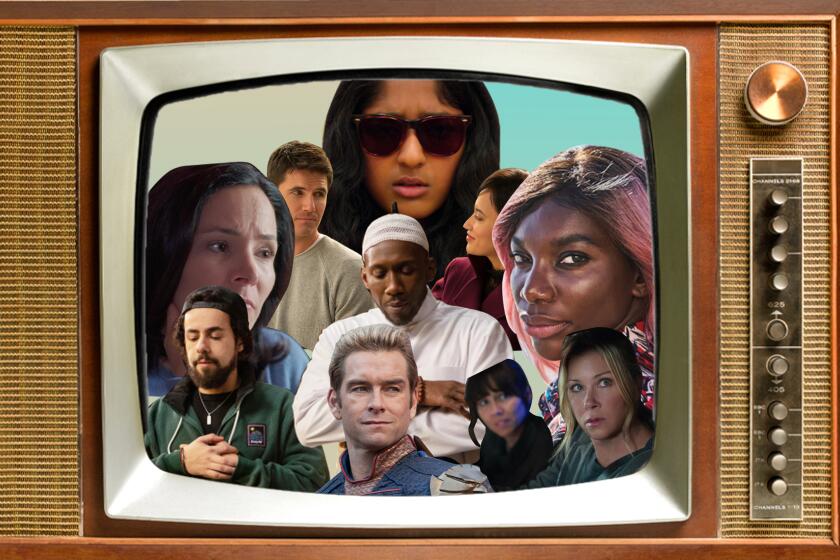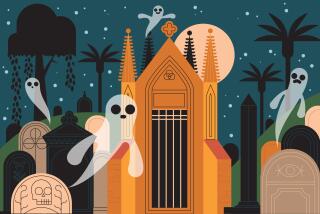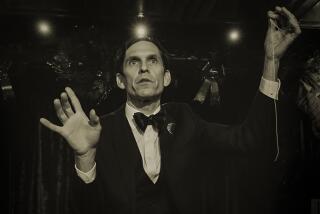In a year of loss, I found comfort and connection in an unlikely place: paranormal TV
- Share via
What have I gained during the COVID-19 pandemic, aside from weight and a new appreciation for grocery delivery services?
The knowledge of what happened to someone I cared for dearly, yet lost track of, someone whose memory I’d lost until he returned to me as a ghost, courtesy of paranormal TV.
No doubt, cabin fever has driven me mad, but I swear this redemptive tale of trash TV is true. In the Before Times, work was so hectic that I didn’t have time to watch anything but new, shiny prestige TV series for review or write about the endless stream of political controversies playing out on our screens. Then came the first safer-at-home order, which meant sheltering in a cramped home with my gangly teenage son, work-at-home husband, two lovable, clumsy pit bulls and one prickly, harder-to-love cat. By the time summer rolled around, we didn’t just need to retreat from the virus outside, we also needed space from one another. More and more time was spent in separate rooms — watching TV, of course.
Having already burned through new shows like “Never Have I Ever,” “Upload” and Season 2 of “Ramy,” I caught up on or rewatched series like “Sons of Anarchy” and “Breaking Bad” (it never gets old). In keeping with 2020, things devolved from there. I found myself watching true crime reenactments while doomscrolling Amazon Fresh for L.A.’s last roll of toilet paper. My worried spouse suggested lighter viewing, so I turned to Animal Planet and Nat Geo Wild. When meerkats and wildebeests failed to distract, the Travel Channel and TLC offered another way to burn away the day: paranormal TV.
Los Angeles Times television critic Lorraine Ali chooses the best TV shows of 2020.
A show like “Ghost Hunters” felt oddly topical, or at least its themes seemed familiar: Regular folks were being traumatized by an invisible, deathly threat; a phantom that seeps under doors and through vents undetected. Paranormal investigators, mediums, intuitives and even an ex-cop ventured into “haunted” houses, historic hotels and abandoned psychiatric wards looking for answers to unexplained phenomena.
And there’s a series for every terrifying situation. Families who swear their homes have been taken over by spirits, poltergeists, shadow people or demons call upon “The Dead Files” team. Steve DiSchiavi is a retired NYPD homicide detective. Amy Allan is a paranormal researcher and psychic. He interviews the living and researches tangible records of properties and people. She sees and speaks with the dead. They investigate each case separately, then meet with the victims and compare notes at the end of the episode. The aggrieved are advised on who or what is wreaking havoc and are given advice on what to do — sprinkle salt around the perimeter, call a shaman, summon a priest, sell the house.
Audiences looking for proof of apparitions have “Ghost Adventures.” Now in their 19th season, Zak Bagans, Nick Groff & Co. lock themselves into “active” locations overnight. These burly, tattooed guys grow increasingly jittery as the night wears on, jumping at the sound of creaking floorboards, recoiling from their own shadows. Their arsenal of ghost-busting equipment includes the Talker (a.k.a. an inductive sensor), which captures electromagnetic waves and converts them into words. An E-field Pod detects the electric field that surrounds a static charge. A simple voice recorder is a “spirit sensor.” During playback, they often hear otherworldly threats — “Get out now!” — where the rest of us hear static. The spirits never seem to fully materialize, and unlike Scooby-Doo, the haunting never turns out to be a scheme cooked up by the innkeeper.
“Long Island Medium” Theresa Caputo purports to help the living overcome the loss of loved ones by using her abilities to channel communication between this life and the afterlife. The grieving frequently report feeling a sense of peace after her readings. The show “helped” reconnect them with loved ones. I have “Ghost Adventures” — the Haunted Hollywood edition — to thank for that. The episode (a repeat, no less) reunited me with a long-lost late friend, Marshall Wyatt.
I’d lost touch with Marshall nearly 25 years ago, when he was in his 80s. I assumed I’d never hear of him again. He was a barkeep and live-in caretaker at the American Legion Hollywood Post 43, an architectural marvel from grander times, described by L.A. Weekly as “a beautiful and ostentatious Egyptian Moroccan revival building on Highland Avenue a stone’s throw from the venerable Hollywood Bowl.” He worked there for 31 years and had the distinction of being the only soul to live full-time on the premises until his death at age 89, which I learned from the show was on March 24, 2000. He now apparently haunts the place.
Marshall has haunted my memory since I met him in an earlier “uncertain time,” just after the ’92 riots. Or was it the ’94 Northridge quake? Regardless, Hollywood was a different place than it is today. It was seedier, cheaper and home to plenty of downscale establishments where Marshall and his peers felt welcome. They were called dive bars.
The Powerhouse was on Highland, just north of Hollywood Boulevard. I bartended there, but not at night when hipsters who’d rediscovered forgotten watering holes like the Firefly or Boardner’s would come rolling in. I started my bleary-eyed shift at 9 a.m. Marshall was my “manager,” but in reality, he was a friend of the bar’s owner, there to help “the new girl.” Stout and tough, he’d totter down Highland with the bar’s keys and cash bag (the owner didn’t trust me yet), open the back door and help set up.
Then he’d sit at the bar as the morning regulars began streaming in, taking their places on the wobbly barstools and cracking pleather booths. The older crowd came in first with their coffees from the nearby McDonald’s. They were all friends of Marshall’s, and most didn’t drink anymore, but they’d meet there anyway to compare notes about what they’d heard on their police scanners the night before. Stabbings, homicides, muggings — ’90s L.A. was the gift that kept on giving. One had worked at the studios back in the day, building sets. He claimed to have drunk with Clark Gable. Another was a former Brown Derby waiter who was still bitter that Mickey Rooney had stiffed him on a tip more than once.
Critic Lorraine Ali writes of seeing her immigrant upbringing in the San Fernando Valley reflected in the Mindy Kaling Netflix comedy ‘Never Have I Ever.’
By 11, the second shift of regulars began to trickle in, shaking and smelling of whatever they were about to drink again. An older, gruff woman and her middle-age son, who had lived together in the same apartment since 1978, usually sat near the far end of the bar. The manager from the Snow White Cafe on Hollywood Boulevard would join them after he finished the breakfast shift. A student or two from a nearby guitar school would slip in for a quick drink between classes.
Marshall knew their habits. He advised me when and what to serve them, and more important, when to cut them off. On my third day, a belligerent desperado wandered in off Fountain Avenue and threatened to jump behind the bar unless I gave him free booze. Little old Marshall all of a sudden got big and ferocious. “Get the f— out!,” he bellowed.
We became fast friends. I went with him to group dinners at the American Legion hall, where we dined with dozens of other veterans and their families. He gave me tours of the premises — a testament to the glamour of old Hollywood — when no one was supposed to be in there. Other times, we sat in the hall’s bar and had drinks. He supposedly haunts that bar now, making the lights flicker and tapping patrons on the shoulder.
I lost touch with Marshall when I left L.A. for New York and a career in writing. According to “Ghost Adventures,” he was nearly 90 when he died after a night of drinking and playing poker. He’d been tying one on in the hall’s Memorial Clubhouse before suffering a stroke in the southeastern stairwell. He died doing what he loved. We should all be so lucky.
The pandemic has robbed us of many things: joy, intimacy, employment and, in the worst cases, life itself. But in the case of my unexpected friendship with Marshall, it brought answers and closure, courtesy of a ghost-hunting show. Strange times indeed.
More to Read
The complete guide to home viewing
Get Screen Gab for everything about the TV shows and streaming movies everyone’s talking about.
You may occasionally receive promotional content from the Los Angeles Times.








